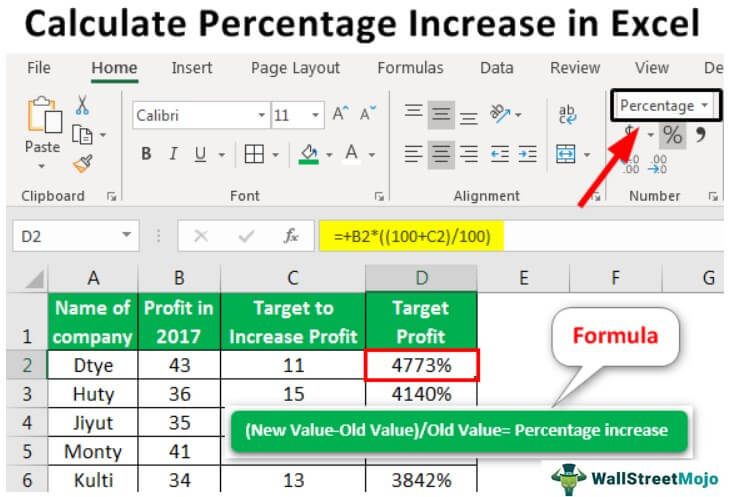Are you tired of not knowing how to calculate your percentage earning? Do you want to learn a simple way to calculate it without feeling overwhelmed? Look no further! In this article, we will guide you through the process of calculating your percentage earning step-by-step.
Pain Points
Many people find calculating their percentage earning confusing and intimidating. They may struggle with math or feel unsure about which formula to use. Others may be concerned about making mistakes that could impact their salary negotiations or financial planning. These issues can lead to frustration, uncertainty, and even avoidance of the task. Luckily, with a clear understanding of the process, anyone can calculate their percentage earning quickly and confidently.
Answering the Target
To calculate your percentage earning, you need to know two things: your total earnings and the percentage of those earnings that represent a specific amount, such as a bonus or commission. To calculate the percentage, you divide the amount by the total and multiply the result by 100. For example, if your total earnings are $5000 and your bonus is $1000, you would divide 1000 by 5000 to get 0.2. Then, you multiply 0.2 by 100 to get 20%. Therefore, your bonus represents 20% of your total earnings.
Summary
To summarize, calculating your percentage earning is a simple process that involves dividing the amount by the total and multiplying by 100. By using this formula, you can determine the percentage of your earnings that represent a specific amount, such as a bonus or commission. With a clear understanding of the process, anyone can calculate their percentage earning confidently.
How to Calculate Percentage Earning
One way to understand the concept of percentage earning is through a personal experience. Imagine that you have been working hard at your job and have been promised a bonus if you meet your performance targets. You’re excited about the prospect of earning some extra income, but you’re not sure how to calculate the percentage of your bonus. To do this, you need to follow the steps outlined above. For instance, if your total earnings for the month were $4000 and your bonus was $600, you would divide 600 by 4000 to get 0.15. Then, you would multiply 0.15 by 100 to get 15%. Therefore, your bonus represents 15% of your total earnings.
In addition to bonuses, percentage earning can also come into play when calculating commissions, raises, or other forms of income. By knowing how to calculate your percentage earning, you can feel more confident and informed about your earnings and negotiate better pay or benefits.
Calculating Percentage Increase
Another aspect of percentage earning is understanding how to calculate a percentage increase. This can be useful when determining how much your earnings have changed over time or when comparing different investment options. To calculate a percentage increase, you need to take the difference between the new value and the old value, divide it by the old value, and multiply by 100. For example, if your salary increased from $40,000 to $50,000, you would subtract 40,000 from 50,000 to get 10,000. Then, you would divide 10,000 by 40,000 to get 0.25. Finally, you would multiply 0.25 by 100 to get 25%. Therefore, your salary increased by 25%.
Why It Matters
Understanding how to calculate percentage earning and increase is essential for financial planning and decision-making. By knowing the percentages of your earnings and expenses, you can create a budget, set financial goals, and track your progress. Additionally, you can use this information to negotiate better pay or benefits, make investment decisions, or compare job offers. By taking control of your financial situation and using percentage earning as a tool, you can build a better future for yourself and your family.
FAQs
Q: What is percentage earning?
A: Percentage earning refers to the percentage of your total earnings that represent a specific amount, such as a bonus or commission.
Q: How do I calculate my percentage earning?
A: To calculate your percentage earning, you need to divide the amount by the total and multiply the result by 100. For example, if your bonus is $1000 and your total earnings are $5000, you would divide 1000 by 5000 to get 0.2. Then, you would multiply 0.2 by 100 to get 20%. Therefore, your bonus represents 20% of your total earnings.
Q: What is a percentage increase?
A: A percentage increase refers to the amount that a value has increased as a percentage of its initial value. To calculate a percentage increase, you need to take the difference between the new value and the old value, divide it by the old value, and multiply by 100.
Q: Why is it important to calculate my percentage earning?
A: Calculating your percentage earning is essential for financial planning, negotiations, and decision-making. By knowing the percentages of your earnings and expenses, you can create a budget, set financial goals, and track your progress.
Conclusion of How to Calculate Percentage Earning
Calculating your percentage earning doesn’t have to be intimidating or confusing. By following the simple formula outlined in this article, you can determine the percentage of your earnings that represent a specific amount, such as a bonus or commission, and make informed decisions about your finances. Whether you’re negotiating a salary, comparing job offers, or planning for the future, understanding percentage earning is a valuable tool that can help you achieve your goals.
Gallery
How To Calculate Percentage – 43 Slides – Skoolmaths- Lessons

Photo Credit by: bing.com / percentage slides
How To Calculate Percentage Increase In Excel? | Step By Step Guide

Photo Credit by: bing.com / percentage increase
How To Calculate Percentage: Solve Through Percentage Formula

Photo Credit by: bing.com / percentage calculate formula solve through
Percentage Calculator Free Tool – Check Percentage From Any Number

Photo Credit by: bing.com /
How To Calculate Percentage: Solve Through Percentage Formula

Photo Credit by: bing.com / percentage calculate nikalte kaise exams